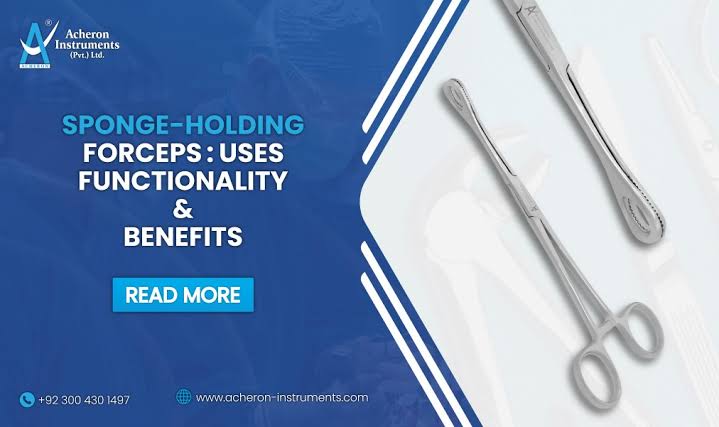In the ever-evolving world of surgical instruments, one tool that continues to play a vital role in both minor and major operations is the sponge holding forceps. Known for their precision, versatility, and utility, these forceps are indispensable in maintaining hygiene, managing bleeding, and assisting with delicate procedures. Whether you’re a medical professional, a student of surgical sciences, or simply someone interested in the inner workings of an operating room, understanding the significance of sponge holding forceps is essential.
What Are Sponge Holding Forceps?
Sponge holding forceps, also known as sponge forceps or sponge sticks, are specialized surgical tools used primarily to hold sponges or swabs during medical procedures. Typically made of high-grade stainless steel, these forceps are designed with ring handles and long shafts ending in serrated or smooth tips. Their robust build allows for firm gripping of surgical sponges, which are used to absorb blood, clean wounds, or apply antiseptics.
In many surgical settings, sponge holding forceps are also used for:
- Blunt dissection of tissue
- Handling delicate organs without direct contact
- Vaginal cleaning before procedures like catheterization or intrauterine device (IUD) placement
- Holding and removing foreign objects in ENT procedures
Key Features and Design
One of the primary reasons for the popularity of sponge holding forceps lies in their ergonomic and functional design. Common features include:
- Ring handles for a secure grip and controlled movement
- Locking ratchets for maintaining constant pressure
- Curved or straight shafts depending on the surgical need
- Fenestrated tips to prevent slippage of the sponge
- Rust-resistant stainless steel construction for easy sterilization and durability
Because of these characteristics, sponge holding forceps are among the most trusted tools in both outpatient and operating room environments.
Types of Sponge Holding Forceps
Different types of surgical procedures require different variants of sponge forceps. Some of the most common types include:
- Straight Sponge Holding Forceps
Ideal for general applications, especially in gynecology and minor surgeries. - Curved Sponge Holding Forceps
Useful for navigating around structures and accessing hard-to-reach areas in deep cavities. - Foerster Sponge Forceps
Widely used in thoracic surgery and for prepping surgical sites.
Selecting the right type ensures precision, safety, and better surgical outcomes.
The Role of Sponge Holding Forceps in Infection Control
Beyond surgical assistance, sponge holding forceps play a critical role in infection prevention and control. By allowing surgeons and nurses to apply antiseptics and handle sponges without hand contact, these tools reduce the risk of cross-contamination. This is particularly important in procedures requiring high levels of sterility, such as orthopedic surgeries, C-sections, and trauma care.
Furthermore, the easy-to-clean design of these forceps supports repeated sterilization, which not only saves costs but also aligns with eco-conscious medical practices.
Choosing High-Quality Surgical Instruments
When it comes to purchasing surgical tools like sponge holding forceps, quality and reliability are non-negotiable. Poorly manufactured instruments can compromise patient safety, prolong surgeries, or even result in complications. That’s why healthcare facilities and distributors prioritize sourcing from trusted Surgical Instruments Manufacturers In Pakistan.
Pakistan has emerged as a global hub for surgical instrument manufacturing, renowned for its craftsmanship, regulatory compliance, and competitive pricing. Leading manufacturers in the region offer:
- CE-certified and ISO-compliant instruments
- Custom branding and OEM solutions
- High-volume capacity with consistent quality
- Innovation in ergonomic and surgical design
This global reputation has made Pakistan a top choice for hospitals and distributors looking for dependable surgical tools, including sponge holding forceps.
Learn More about sportswear manufacturers in pakistan
How to Maintain Sponge Holding Forceps
To ensure longevity and optimal performance, sponge holding forceps require proper handling and care. Here are a few tips:
- Clean immediately after use to avoid residue buildup
- Use ultrasonic cleaners for deep cleaning in hinges and joints
- Sterilize properly, adhering to autoclaving guidelines
- Inspect regularly for signs of rust, loosening joints, or wear and tear
- Store in dry, temperature-controlled environments
Adhering to these practices ensures the instruments remain safe and effective across multiple procedures.
Final Thoughts
The importance of sponge holding forceps in modern surgery cannot be overstated. From ensuring sterile application of antiseptics to facilitating tissue handling, their role is both foundational and diverse. As medical science advances, the demand for high-quality surgical tools continues to grow, underscoring the value of sourcing from reputable suppliers like Surgical Instruments Manufacturers In Pakistan.
Whether you’re outfitting a new operating room, expanding your clinic’s toolkit, or looking to learn more about surgical essentials, understanding the functionality and importance of instruments like sponge holding forceps is a vital step toward better patient care and surgical precision.






